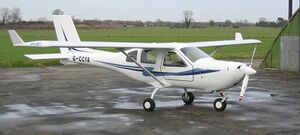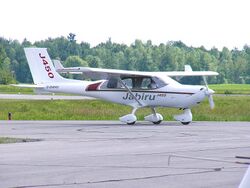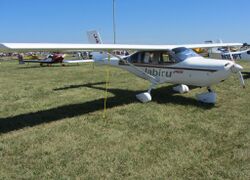Engineering:Jabiru J430
| Jabiru J430 | |
|---|---|

| |
| Role | Light Sport Aircraft Homebuilt |
| National origin | Australia |
| Manufacturer | Jabiru Aircraft |
| Developed from | Jabiru J230 |
The Jabiru J430 is one model in a large family of two- and four-seat Australia n light aircraft developed as a touring aircraft and provided in kit form by Jabiru Aircraft.[1][2]
Design and development
The J430 is constructed from composite materials. The 31.3 ft (9.5 m) span high wing is strut-braced and features winglets. The standard engine is the 120 hp (89 kW) Jabiru 3300 six-cylinder, horizontally opposed, four-stroke aircraft engine. The tricycle landing gear has optional wheel pants. The four-seat cabin features a width of 44 in (112 cm). Construction time from the factory-supplied kit is reported to be 600 hours. Twenty-five examples were completed and flying by the end of 2011.[1]
Variants

data from Jabiru[3]
- Jabiru J200
- Jabiru J230
- A two-seat version of the J430, designed as a US light-sport aircraft, with a large baggage compartment behind the seats.[1][4][5]
- Jabiru J250
- Model similar to the J450, with the back seat removed to give a large cargo area.[5]
- Jabiru J400
- Four-seat version powered by a 120 hp (89 kW) Jabiru 3300 engine and marketed circa 2004.[2][5]
- Jabiru J430
- A four-seater version of the J230 with two seats in the former baggage compartment.[1][5]

- Jabiru J450
- Four seat model.[5]
- Jabiru SP
- Two-seat version for the US light-sport aircraft market, powered by a 120 hp (89 kW) Jabiru 3300 engine and marketed circa 2004. The SP has a cruise speed of 213 km/h (132 mph)[2]
- Jabiru UL
- Two-seat version for the European microlight category powered by an 80 hp (60 kW) Jabiru 2200 engine and marketed circa 2004. The UL has a cruise speed of 185 km/h (115 mph)[2]
Specifications (J430)
Data from Jabiru Pacific [6]
General characteristics
- Crew: one
- Capacity: 3 passengers
- Length: 6.55 m (21 ft 5.8 in)
- Wingspan: 9.433 m (30 ft 11 in)
- Height: 2.40 m (7 ft 10 in)
- Wing area: 9.34 m2 (100.5 sq ft)
- Empty weight: 340 kg (748 lb)
- Max takeoff weight: 760 kg (1,675 lb)
- Powerplant: 1 × Jabiru 3300 6 cylinder, 4 stroke piston engine, 89.5 kW (120 hp)
- Propellers: 1.52 m (5 ft 0 in) diameter 2-bladed Wooden/Composite
Performance
- Maximum speed: 256 km/h (160 mph, 140 kn)
- Cruise speed: 222 km/h (138 mph, 120 kn)
- Stall speed: 92 km/h (57 mph, 50 kn)
- Range: 1,480 km (920 mi, 800 nmi)
- Service ceiling: 4,600 m (15,000 ft)
- Rate of climb: 3.6 m/s (700 ft/min)
- Wing loading: 74.7 kg/m2 (15.3 lb/sq ft)
- Power/mass: 4.3 kg/kW (12.8 lb/hp )
- Flight Load Factor: + 3.8g - 1.9g
References
- ↑ 1.0 1.1 1.2 1.3 Vandermeullen, Richard: 2011 Kit Aircraft Buyer's Guide, Kitplanes, Volume 28, Number 12, December 2011, page 57. Belvoir Publications. ISSN 0891-1851
- ↑ 2.0 2.1 2.2 2.3 Bertrand, Noel; Rene Coulon; et al: World Directory of Leisure Aviation 2003-04, pages 145 and 185. Pagefast Ltd, Lancaster OK, 2003. ISSN 1368-485X
- ↑ "Jabiru Aircraft Southern Africa". Jabiru.co.za. http://www.jabiru.co.za/aircraft.htm.
- ↑ Bayerl, Robby; Martin Berkemeier; et al: World Directory of Leisure Aviation 2011-12, page 61. WDLA UK, Lancaster UK, 2011. ISSN 1368-485X
- ↑ 5.0 5.1 5.2 5.3 5.4 Tacke, Willi; Marino Boric; et al: World Directory of Light Aviation 2015-16, pages 64 and 111. Flying Pages Europe SARL, 2015. ISSN 1368-485X
- ↑ Jabiru J230 & J430 Kitplane
External links
 |
